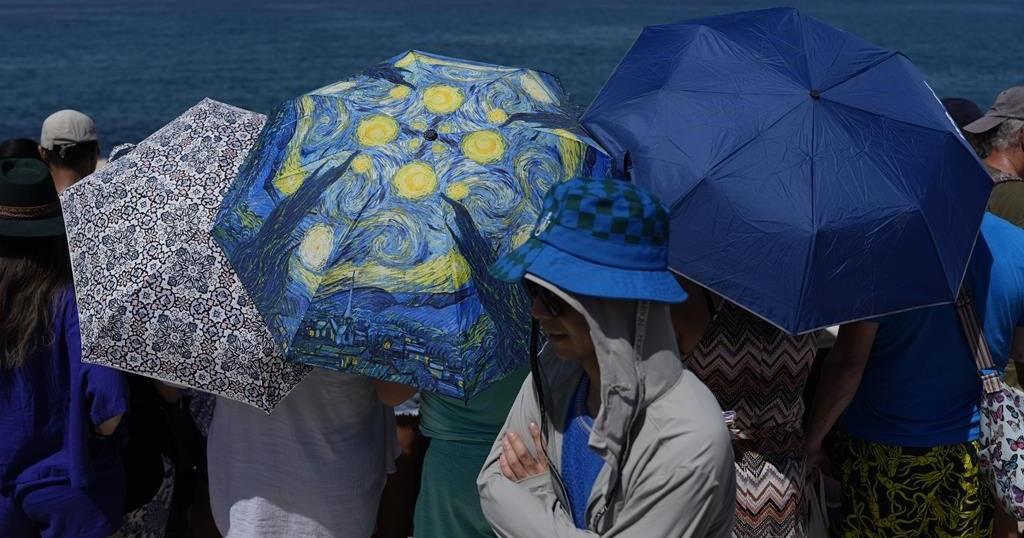PARIS (AP) — The 2024 Olympics famously launched with a rain-soaked opening ceremony that drenched athletes and spectators alike. Now, they’re facing the opposite experience Tuesday: a heat wave.
Most of France is under a heat wave warning Tuesday, with temperatures in Paris and surrounding areas expected to climb to 35 C (95 F) or higher, the national weather agency said. Air conditioning is far less common in homes, shops and restaurants than in places like the United States.
The heat was expected to be even worse in the south, including the region around the Mediterranean city of Marseille that is hosting Olympic competitions like soccer and sailing. It was as hot as 40 degrees Celsius (104 Fahrenheit) in parts of southern France on Monday and the temperatures were expected to be that high again Tuesday.
Back-to-back record global heat was seen last week as climate change makes extreme weather more frequent and intense. Paris 2024 organizers have aimed to cut the event’s carbon footprint, among them turning to an underfloor cooling system and insulation instead of air conditioning at the Olympic village where athletes are staying. Some countries, like the U.S., brought their own.
Government officials and Olympic organizers are preparing visitors and athletes for a sweaty and sunny Tuesday after the Games got off to a soggy start. Thunderstorms were also expected to sweep into the Paris area in the evening.
A handful of misters were set up at La Concorde urban park, the venue that includes skateboarding and BMX freestyle cycling, and people were already dunking their heads on a warm Monday or cooling off with ice cream.
The Paris area’s train and metro operator said it will distribute more than 2.5 million containers of water at over 70 train stations and other stops on its transport network, as well as at bus stations.
For the equestrian teams, they have a system to keep their horses cool between competitions held in the regal gardens of the Palace of Versailles outside Paris.
The animals are sprayed with cooling water on both sides and stay in the shade after riding the course, which doesn’t take long.
“I would be more worried for the spectators to be honest,” said German rider Julia Krajewski, the defending Olympic champion in the category of individual eventing.
Otherwise, she wasn’t worried about competing in her thick jacket, helmet and heavy boots.
“I personally prefer the heat to the cold. I don’t struggle with the heat,” Krajewski said Monday. “Of course, you have to be sensitive, know your horse. (But) the horses struggle less than the average human being.”
Other athletes weren’t too concerned either as temperatures around Paris reached the low 30s C (the high 80s F) on Monday.
U.S. tennis player Coco Gauff said she “felt good” after her match and that it was “like playing in Florida.” And even if it gets hotter, she won’t be bothered.
“I feel like I know how to survive in that type of weather maybe better than some other players,” she said. “I did use the ice towel, which I rarely do at matches, but it was more of a preventative thing.”
On the other hand, Serbian tennis star Novak Djokovic, who beat rival Rafael Nadal, found it “pretty hot on the court,” noting the change from Saturday’s rain. “Paris weather is quite unpredictable.”
In the south of France, American windsurfer Dominique Stater wore a vest filled with ice packs after her races in Marseille on Monday, where it hit 88 degrees in the late afternoon.
“It’s pretty crazy heat, more than Miami,” said Stater, who’s from the sweltering Florida metropolis.
Stater said staying hydrated is top of mind, especially because the windsurfers are swathed in extensive protective gear.
That’s the same advice weather officials are passing along to those planning to be outside on Tuesday: hydrate, avoid going out in the afternoon when it’s hottest and wear a hat.
France’s national weather agency described heat waves as “increasingly intense, frequent, early and long-lasting” amid climate change. It said that before 1989, such high temperatures were observed on average once every five years, and since 2000, they repeat every year. It predicts the trend will keep increasing.
___
AP writers Jerome Pugmire in Versailles; Jenna Fryer, Howard Fendrich, Hanna Arhirova, Stephen Whyno and Courtney Bonnell in Paris, and Giovanna Dell’Orto in Marseilles contributed.

























